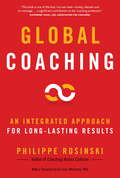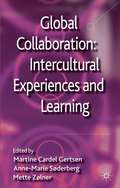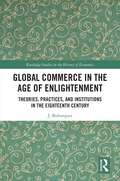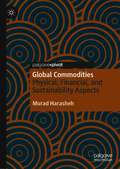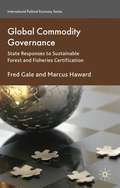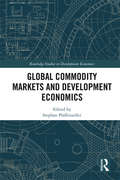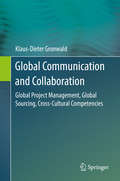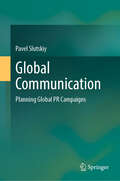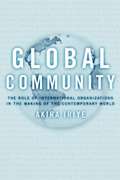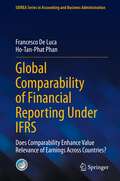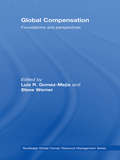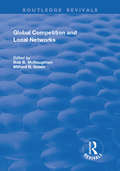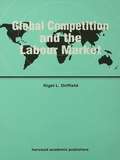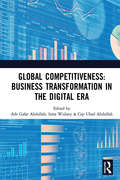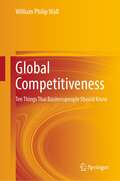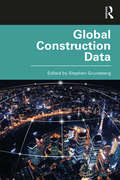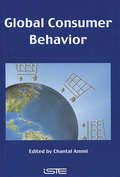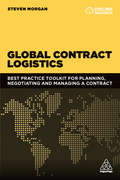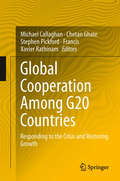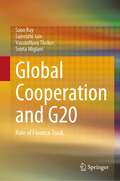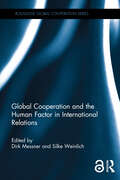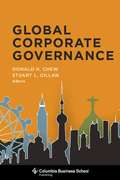- Table View
- List View
Global Coaching: An Integrated Approach for Long-Lasting Results
by Philippe RosinskiThe need for a “master level” of coaching has never been greater in the global economy and interconnected world in which we live. Global Coaching inspires managers and coaches to find meaningful and long-lasting results through an integrated approach, combining coaching strategies from six perspectives—physical, managerial, psychological, cultural, political and spiritual. Philippe Rosinski’s pioneering work in bringing the crucial intercultural dimension into the practice of coaching has won him worldwide acclaim. The first European to be designated Master Certified Coach by the International Coach Federation, he is a leading expert in executive coaching, team coaching and global leadership development. He is currently principal of Rosinski & Company, a global consulting firm that helps leaders, teams and organizations unleash their human potential to achieve sustainable high performance. He is an MBA professor for global managers at the Kenichi Ohmae Graduate School of Business in Tokyo, Japan. For more information, visit www.philrosinski.com and www.globalcoaching.pro.
Global Collaboration: Intercultural Experiences and Learning
by Martine Cardel Gertsen Anne-Marie Søderberg Mette ZølnerOffers qualitative studies of collaboration processes conducted in globalising companies based in Denmark and with subsidiaries in Asia. It addresses the specific contexts of collaboration and studies how people with different cultural backgrounds work together, both face-to-face and in the virtual workplace.
Global Commerce in the Age of Enlightenment: Theories, Practices, and Institutions in the Eighteenth Century (Routledge Studies in the History of Economics)
by Jesús BohorquezCombining contextual, institutional and global perspectives, this book evaluates the impact of international trade on eighteenth-century economic thought. It meticulously delineates how economic ideas and institutions flowed between North and South Europe and across the Indian and Atlantic Oceans during the Age of Enlightenment. Global Commerce in the Age of Enlightenment carefully explores contemporary debates about economic institutions, which were a crucial element in the race for controlling international trade. Eighteenth-century thinkers devoted much attention to the relative merits of existing institutions, such as free ports, grasped the dangers of economic dependence, and appraised emerging conceptions of property rights. The author draws on an impressive range of sources, including pamphlets and travel accounts, and work from lesser-known figures such as Pierre Poivre and Ange Goudar. This volume will be valuable reading for advanced students and researchers of the history of economic thought, economic history, political economy, the history of ideas and global history.
Global Commodities: Physical, Financial, and Sustainability Aspects
by Murad HarashehFor many academics, students, and professionals, the field of commodities is a black box. This book explores commodities in a holistic manner, presenting concepts from a multidisciplinary business and financial perspective, and offering a panoramic view of the global commodity business and markets. In this book, the author presents core issues related to global commodities with recent data including COVID-19. The book introduces the key physical commodities traded globally and some related issues such as the global supply chain, global trading, transportation, storage, and how to finance global commodity trades. Then, it discusses how global commodity businesses and traders manage global risks related to commodity production (generation or extraction), transportation, storage, the final delivery, and currency exchange. Additionally, the book discusses financial commodities, the origins of global commodity derivatives and exchanges, the rationale behind the birth of commodity futures and trading, hedging, speculation, financialization, and manipulation of commodity markets, and how financial trading is executed in real life. In the last section, the author also discusses sustainability issues related to global commodities and the financial valuation aspects of the global commodity businesses supported by examples from real cases with recent data.
Global Commodity Governance
by Fred Gale Marcus HawardThe Forest and the Marine Stewardship Councils constitute new global governance institutions using voluntary certification and labelling as market incentives to encourage sustainable management. Utilizing a comparative political economic framework, the authors analyse shifting British, Canadian and Australian responses to the stewardship councils.
Global Commodity Markets and Development Economics (Routledge Studies in Development Economics)
by Stephan PfaffenzellerThe early 21st century has seen a prolonged price boom in non-fuel commodities, coupled with a volatile performance in fuel prices. This new collection presents the latest research on commodity prices and economic development in the context of this changing globalized economy. Global Commodity Markets and Development Economics brings together analyses from a number of perspectives in order to explore commodity price developments. Chapters explore long term commodity trends, the evolution of relative price developments, the relationship of the domestic commodity sector with global supply chains, agri-food prices, and the role of oil markets in the global economy. Through considering a diverse range of countries including China, Russia and the United States, the authors examine key fuel and non-fuel commodity markets and offer a window into important trends and developments. This book will be relevant to those with an interest in development economics, international economics and energy markets.
Global Communication and Collaboration
by Klaus-Dieter GronwaldSpeed, social change, historical inheritance and cultural gaps are the key success factors which have significant impact on global collaboration and global sourcing. The author explains how working in virtual teams in a global, multicultural environment requires a significant amount of organizational and behavioral change of people and organizations. Understanding cultural differences in working styles is important for successful global project management. Major theories of international management, company internationalization, cultural dimensions and distances will be discussed to develop cross-cultural competencies and conflict management styles for international project managers. They will understand modern theories and methods of international management and will be able to apply these to practical project management problems. They understand the benefits and challenges of international cooperation and know how to identify modes of cooperation that are relevant to the needs of international teams.
Global Communication: Planning Global PR Campaigns
by Pavel SlutskiyThis textbook equips students with essential media and communication skills for today&’s interconnected world. Developed as a key companion text for the Global Communication Project (GlobCom), an initiative spanning five continents, the book presents the key concepts that underpin effective communication on a global scale and guides the reader through project development, covering cross-cultural communication processes and virtual collaboration dynamics. In today&’s rapidly evolving global communication landscape, professionals with expertise in global public relations (PR) are in high demand. For students looking to develop their global PR competences, the GlobCom Project offers an authentic experience aligned with industry expectations and is a platform for related courses to draw from. This textbook provides both theoretical and practical material to enhance students&’ learning experience, and serves as a valuable resource for lecturers and advanced undergraduate and graduate students in the media, marketing communication, and PR fields. By offering insights into the complexities of international communication, it helps aspiring and current professionals become skilled and globally aware in their approach to global communication.
Global Community: The Role of International Organizations in the Making of the Contemporary World
by Akira IriyeExamines the concept of "global community" by looking at the emergence, growth, and activities of international organizations--both governmental and nongovernmental--from the end of the nineteenth century to today.
Global Comparability of Financial Reporting Under IFRS: Does Comparability Enhance Value Relevance of Earnings Across Countries? (SIDREA Series in Accounting and Business Administration)
by Francesco De Luca Ho-Tan-Phat PhanThe globalization of financial markets worldwide has progressively pushed toward simultaneous globalization of accounting information. Thus, during the last 50 years, categories of preparers, users, and regulators have devoted their efforts to support the global comparability of financial reporting aiming at favoring the comparison of corporates’ financial performances at a cross-country level. In the same vein, IASB, national standard setters, and jurisdictions have participated in and given momentum to this process. At the same time, academic research has followed this process and tried to build a theoretical framework to address the related issues, to assess the impact on preparers, users, and regulators, while defining hindrances and obstacles to the comparability of financial reporting especially in an IFRS environment. In this context, this book reviews research studies on the comparability of financial reporting at a global level as well as highlights empirical analyses that demonstrate the extent to which global comparability has been achieved, and how it enhances value relevance of earnings across countries. It also looks at the cross-country investors’ perspectives by shaping the empirical analysis to provide further insights on the role of the "Big Four" auditing services in enhancing the comparability of earnings. The book provides an original contribution to the current debate about the comparability of financial reporting under IFRS and will be useful for researchers in the field.
Global Compensation: Foundations and Perspectives (Global HRM)
by Luis R. Gomez-Mejia Steve WernerCompensation is a systematic approach to providing monetary value and other benefits to employees in exchange for their work and service. But pay and conditions becomes a more complicated issue for multinational companies which operate across different locations and cultures, and who employ an increasingly diverse range of personnel. This unique new text gives in-depth analysis of the key themes and emerging topics faced by global enterprises when dealing with compensation issues. The first section, ‘Foundation Concepts’, looks at the design of compensation packages for a number of different employee groups; from supply chain management to research and development, as well as ethical considerations when dealing with a global context, and the concept of performance related pay. The second section, ‘Global Applications’, looks at current debates in the field, including the influence of national cultures on compensation schemes, discrepancies in CEO pay, and contrasts in wages between industry types. Part of Routledge’s Global HRM, this is is an invaluable text for any student of HRM, Business and Management, or any practitioner working in this area.
Global Competition and Local Networks
by Rod B. McNaughtonThis title was first published in 2002. The interest in becoming globally competitive through network strategies, particularly networks between small and medium-sized firms in local business communities, is high among academic researchers, economic development agencies and growth orientated firms. Important contributions to our understanding of the strategic use of networks are coming from a number of disciplinary and theoretical perspectives. This volume provides a unique opportunity to both synthesize this diverse literature and report the results of original research. It is particularly relevant to scholars of business and management, geography and economics
Global Competition and the Labour Market (Routledge Studies in Global Competition)
by Nigel DriffieldThis study combines an industry level and a firm level analysis on the wage and employment effects of multinational companies. This has not been attempted in any previous work. In view of the results, important questions are raised regarding how global changes in the structure of production may affect labour markets and the organisation of work in the future.
Global Competitiveness: Proceedings of the First Economics and Business Competitiveness International Conference (EBCICON 2018), September 21-22, 2018, Bali, Indonesia
by Ade Gafar Abdullah, Isma Widiaty & Cep Ubad AbdullahThe proceedings of the "Economics and Business Competitiveness International Conference" (EBCICON) provides a selection of papers, either research results or literature reviews, on business transformation in the digital era. Nine major subject areas, comprising accounting and governance, customer relations, entrepreneurship, environmental issues, finance and investment, human capital, industrial revolution 4.0, international issues, and operations and supply chain management are presented in the proceedings. These papers will provide new insights into the knowledge and practice of business and economics in the digital era. Therefore, parties involved in business and economics such as academics, practitioners, business leaders, and others will be interested in the contents of the proceedings.
Global Competitiveness: Ten Things Thai Businesspeople Should Know
by William Philip WallThis book discusses the aspects of global competition in terms of the strategies that could be applied to improve the competitive position of businesses and consolidate gains particularly in the Thai market. The book is composed of 10 chapters focusing on topics related to business strategy, such as competition, marketing, innovation, utilizing information, technology, human resources, strategic alliances, customer service, implementation, monitoring and evaluation of strategies, and corporate social responsibility. This book will serve as a useful guide for those already in business in Thailand as well as for businesses that hope to expand their existing operations in Thailand to the global market.
Global Consequences of Russia's Invasion of Ukraine: The Economics and Politics of the Second Cold War
by Grzegorz W. KolodkoThis book highlights the geopolitical and economic consequences of the Russia’s invasion of Ukraine. The author, a key architect of Polish eco-nomic reforms and the most frequently cited economist from post-Com-munist countries, shares new insights into the causes and mechanisms of the Second Cold War. Written in an unorthodox, bold and lucid style, the book raises provocative issues and provides convincing answers to some of the most difficult questions, such as who the true beneficiaries and interest groups behind the war are, and what their motives and con-flicting goals are. The book also introduces readers to the greatest challenge of our time, climate change, and explores the long-term effects of the current arms race and rearmament spiral on global warming. This interdisciplinary book, which also addresses the challenges of inflation, mass migrations and clashes between democracy and authoritarianism, will appeal to anyone interested in the contemporary geopolitical shifts triggered by the Russia’s invasion of Ukraine, but also in the dynamics and directions of the evolution of the new cold war.
Global Construction Data
by Stephen GrunebergGlobal construction data is vital for contractors, governments, international organisations, policy makers, academic researchers and statisticians. As the global population of the world expands, the sustainability of the built environment raises the political agenda and the need to manage infrastructure and buildings in both urban and rural contexts becomes ever more pressing. How much more can the built environment grow and how can it be managed sustainably? This edited volume addresses how we can find a possible way through the inconsistencies between national construction data sets to devise a consistent approach to national construction data to further the global sustainability agenda and inform policy making. This search begins in Part I, which looks at the methods and definitions used in construction statistics in different countries. Part II considers examples of different types of construction data from the cost of materials, measuring work on high rise buildings and existing stock. In Part III, the authors consider construction data internationally, beginning with the problem of comparing data in different countries using exchange rates and purchasing power parities (PPPs), comparing innovation processes in different countries and looking at the provision of building design internationally. In Part IV, the international theme is continued by comparing accounting practices and company performance in different countries and concludes with an international comparison of construction industries. This book raises awareness of the significance of the construction industry globally and the importance of data to measure it. It informs the discussion of the best ways of handling the consequences of policies affecting the built environment and the effect of the built environment on the rest of the economy and society. It is essential reading for international economists, construction industry consultants, policy makers, construction statisticians and academics.
Global Consumer Behavior (Wiley-iste Ser.)
by Chantal AmmiGlobalization is a leading force for industry worldwide, especially the new technology sector. This presents both problems and opportunities in the emergence of a new type of consumer and the effects of globalization on industry in terms of culture, economics, marketing, and social issues at every scale from local to global. The main aim of the book is to enhance the reader’s knowledge – especially from a multidisciplinary perspective rather than from an individual functional perspective – of international consumer behaviour. It also explores the role of globalization in the evolving world of the new technology sector and provides an overview of the development of international consumer behavior from historical, geographical and social perspectives, while focusing on new technology products and services. Professionals, students and researchers working in the fields of new technologies and information and communication technologies (ICT) as well as specialists of marketing and management are the target audience for this book. At the same time, the book will be pitched at a level so as to also appeal to a more general readership interested in globalization.
Global Contract Logistics: Best Practice Toolkit for Planning, Negotiating and Managing a Contract
by Steven MorganThe role of a contracting professional begins well before the award of a contract and doesn't end until the benefits of the acquisition have been realised, long after the deliverables arrive in a box on a loading dock. Global Contract Logistics tackles the growing complexity of contracting in a technologically accelerating world. The author looks at the common errors and the ten phases of a successful acquisition.Global Contract Logistics examines what it takes to be an intelligent client, one who employs contracting or procurement professionals to obtain goods and services on their behalf. It debunks many commonly held myths involving contracting, procurement and acquisition and outlines ten vital steps towards success for intelligent clients and their supporting acquisition professionals. The text is supported by case studies of projects that the author Steve Morgan has led, during his time with the Ministry of Defence and BAA. Online supporting resources include contract templates for procurement and acquisition projects.
Global Cooperation Among G20 Countries
by Stephen Pickford Michael Callaghan Chetan Ghate Francis Xavier RathinamAt the outbreak of the global financial crisis, 2008, the G20 was widely acknowledged as helping prevent an even more serious decline in the global economy. It helped to calm the panic in financial markets and articulate a set of possible policy options to restore global stability and growth. However, as the dual-track recovery set in, policy options for advanced economies and EMEs diverged. Within this context, this book will explore the scope for cooperation amongst the G20 and the diverging challenges and the intricate interconnectedness of policy options between advanced economies and the EMEs within the G20.
Global Cooperation and G20: Role of Finance Track
by Saon Ray Smita Miglani Samridhi Jain Vasundhara ThakurThis book focuses on one of the two G20 tracks, the finance track. It examines the evolution of the finance track in G20, the organizational structure of the finance track, and the role of international organizations in reforming the financial architecture. It discusses how the agenda is formed and driven by the political economy of the host country as well as the imperative of the time. It also documents the finance track themes taken up by different G20 presidencies over the years. Some of the common threads between the G20 emerging economies’ presidencies in terms of the finance track themes that the G20 leaders have considered include financial sector regulation and reform, reform of international financial institutions, global growth and macroeconomic policies, international taxation, and financial inclusion. The book is an excellent resource for the researchers of international economics as well as for policymakers.
Global Cooperation and the Human Factor in International Relations (Routledge Global Cooperation Series)
by Silke Weinlich Dirk MessnerThis book aims to pave the way for a new interdisciplinary approach to global cooperation research. It does so by bringing in disciplines whose insights about human behaviour might provide a crucial yet hitherto neglected foundation for understanding how and under which conditions global cooperation can succeed. As the first profoundly interdisciplinary book dealing with global cooperation, it provides the state of the art on human cooperation in selected disciplines (evolutionary anthropology and biology, decision-sciences, social psychology, complex system sciences), written by leading experts. The book argues that scholars in the field of global governance should know and could learn from what other disciplines tell us about the capabilities and limits of humans to cooperate. This new knowledge will generate food for thought and cause creative disturbances, allowing us a different interpretation of the obstacles to cooperation observed in world politics today. It also offers first accounts of interdisciplinary global cooperation research, for instance by exploring the possibilities and consequences of global we-identities, by describing the basic cooperation mechanism that are valid across disciplines, or by bringing an evolutionary perspective to diplomacy. This book will be of great interest to scholars and postgraduates in International Relations, Global Governance and International Development.
Global Cooperation and the Human Factor in International Relations (Routledge Global Cooperation Series)
by Dirk Messner and Silke WeinlichThis book aims to pave the way for a new interdisciplinary approach to global cooperation research. It does so by bringing in disciplines whose insights about human behaviour might provide a crucial yet hitherto neglected foundation for understanding how and under which conditions global cooperation can succeed.As the first profoundly interdisciplinary book dealing with global cooperation, it provides the state of the art on human cooperation in selected disciplines (evolutionary anthropology and biology, decision-sciences, social psychology, complex system sciences), written by leading experts. The book argues that scholars in the field of global governance should know and could learn from what other disciplines tell us about the capabilities and limits of humans to cooperate. This new knowledge will generate food for thought and cause creative disturbances, allowing us a different interpretation of the obstacles to cooperation observed in world politics today. It also offers first accounts of interdisciplinary global cooperation research, for instance by exploring the possibilities and consequences of global we-identities, by describing the basic cooperation mechanism that are valid across disciplines, or by bringing an evolutionary perspective to diplomacy.This book will be of great interest to scholars and postgraduates in International Relations, Global Governance and International Development.
Global Corporate Governance
by Stuart L Gillan Donald H. ChewEffective corporate governance, or the set of controls and incentives that drive top management, originates both outside and inside the firm and assures investors who hope to commit their capital. Essential when buying stocks in one's own country, effective corporate governance is even more important abroad, where information can be less reliable and investor influence (or protection) more limited. In this collection of articles from the Journal of Applied Corporate Finance, more than thirty leading scholars and practitioners discuss the possibilities and limitations of global corporate finance and governance systems, whether in Europe and North America or in the emerging markets of Israel, India, Korea, and South Africa. Essays discuss the political roots of American corporate finance; the structural and financial variations between international corporations; control premiums and the effectiveness of corporate governance systems; debt, folklore, and cross-country differences in financial structures; the driving forces behind the East Asian Financial Crisis of 1997; corporate ownership and control in India, Germany, France, and the United Kingdom; financial and economic lessons of Italy's privatization program; changes in Korean corporate governance; sovereign wealth funds; and the new organization of Canadian business trusts.
Global Corporate Governance (Columbia Business School Publishing Ser.)
by Stuart L Gillan Donald H. Chew Eds.Effective corporate governance, or the set of controls and incentives that drive top management, originates both outside and inside the firm and assures investors who hope to commit their capital. Essential when buying stocks in one's own country, effective corporate governance is even more important abroad, where information can be less reliable and investor influence (or protection) more limited. In this collection of articles from the Journal of Applied Corporate Finance, more than thirty leading scholars and practitioners discuss the possibilities and limitations of global corporate finance and governance systems, whether in Europe and North America or in the emerging markets of Israel, India, Korea, and South Africa. Essays discuss the political roots of American corporate finance; the structural and financial variations between international corporations; control premiums and the effectiveness of corporate governance systems; debt, folklore, and cross-country differences in financial structures; the driving forces behind the East Asian Financial Crisis of 1997; corporate ownership and control in India, Germany, France, and the United Kingdom; financial and economic lessons of Italy's privatization program; changes in Korean corporate governance; sovereign wealth funds; and the new organization of Canadian business trusts. A special roundtable discussion addresses shareholder activism in the U.K.
